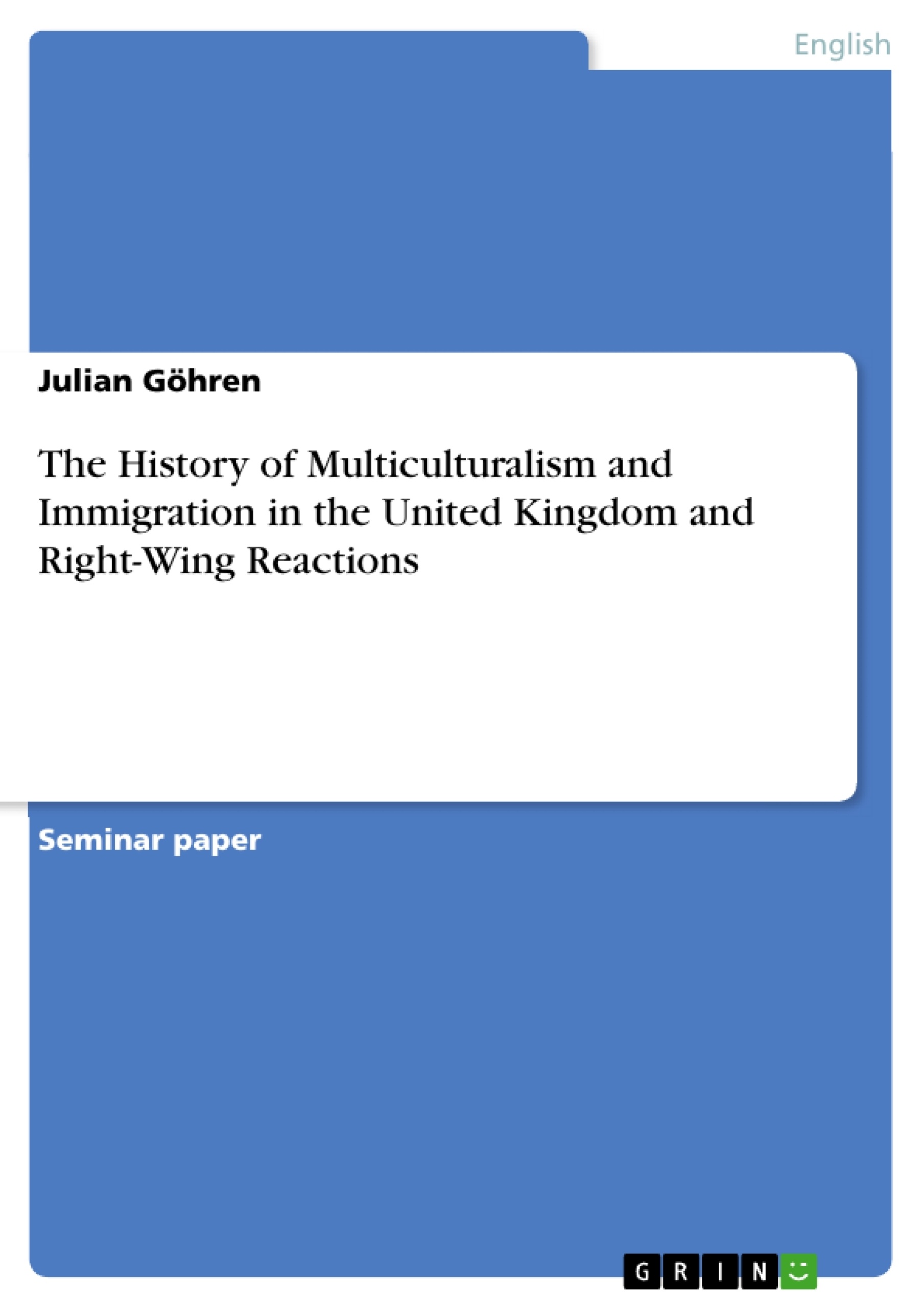Ein kurzer Überblick über das Thema Einwanderung in das Vereinigte Königreich ab dem 19. Jahrhundert.
Die Hausarbeit beschäftigt sich u.a. mit den vielfältigen Gründen für die Einwanderung und wie die politische Rechte auf den gesellschaftlichen Wandel reagierte. Dazu wird das Thema als Inhalt einer Unterrichtsreihe betrachtet.
Inhaltsverzeichnis (Table of Contents)
- 1. Introduction
- 2. Brief history of British multiculturalism
- 3. Reasons for the influx of immigrants after World War II
- 4. Reactions from the Right
- 5. Multiculturalism in the UK today
- 6. The subject as a school topic
Zielsetzung und Themenschwerpunkte (Objectives and Key Themes)
This term paper examines the history of multiculturalism in the UK, focusing on the post-World War II immigration waves and the right-wing reactions to them. It aims to provide a broad overview of the topic, from the initial waves of immigration to the current state of multiculturalism in the country and its relevance to today's students.
- Historical development of British multiculturalism
- Reasons for post-WWII immigration to the UK
- Right-wing responses to immigration
- The impact of immigration on British society
- Relevance of the topic for contemporary education
Zusammenfassung der Kapitel (Chapter Summaries)
1. Introduction: This introductory chapter sets the stage by establishing the long history of multiculturalism in the UK, tracing it back to the British Empire's global reach. It emphasizes that while multiculturalism has existed for centuries, the post-World War II period witnessed a significant shift in the demographic makeup of the UK due to increased immigration. The chapter highlights the transition from a relatively homogenous society to a more diverse one and lays out the paper's scope, focusing on right-wing reactions to these changes, using Enoch Powell's "Rivers of Blood" speech as a key example.
2. Brief history of British multiculturalism: This chapter delves into the historical waves of immigration to the UK, beginning with 19th-century European immigrants, notably the Irish fleeing the potato famine and Jews escaping persecution in Tsarist Russia. It details the challenges these groups faced, including prejudice and discrimination, yet also their eventual assimilation into British society. The chapter then transitions to the arrival of the "Windrush Generation" in 1948, marking a significant turning point with the arrival of large numbers of non-white immigrants from the West Indies. This section sets the context for understanding the later waves of immigration and the societal reactions that followed.
3. Reasons for the influx of immigrants after World War II: This chapter explores the various factors contributing to the post-war immigration boom into the UK. It identifies several key reasons, including the relatively low cost of overseas travel, the economic needs of post-war Britain requiring a large workforce for reconstruction and the Commonwealth citizenship status which granted many immigrants the right to settle in the UK. The chapter likely analyzes the interplay of these push and pull factors that resulted in the substantial increase in immigration during this period.
Schlüsselwörter (Keywords)
Multiculturalism, British history, immigration, right-wing reactions, post-World War II, Enoch Powell, Windrush Generation, assimilation, racism, social integration, education.
Frequently Asked Questions: A Comprehensive Language Preview on British Multiculturalism
What is the purpose of this document?
This document provides a comprehensive preview of a term paper examining the history of multiculturalism in the UK, focusing on post-World War II immigration and right-wing reactions. It includes the table of contents, objectives, key themes, chapter summaries, and keywords.
What topics are covered in the term paper?
The term paper covers the historical development of British multiculturalism, reasons for post-WWII immigration to the UK, right-wing responses to immigration, the impact of immigration on British society, and the relevance of the topic for contemporary education.
What is the timeframe of the paper's focus?
The paper primarily focuses on the post-World War II period, examining the significant immigration waves and societal responses during this time.
Which historical events are discussed?
The paper discusses the post-World War II immigration waves, including the arrival of the Windrush Generation in 1948. It also touches upon earlier immigration waves, such as 19th-century European immigration (Irish and Jewish). Enoch Powell's "Rivers of Blood" speech is mentioned as a key example of right-wing reaction.
What are the key themes explored in the paper?
Key themes include the historical development of British multiculturalism, the push and pull factors contributing to post-war immigration, right-wing responses to immigration (including racism and discrimination), the process of assimilation and social integration, and the relevance of this history to contemporary education.
What are the chapter summaries?
Chapter 1 provides an introduction, establishing the long history of multiculturalism in the UK and highlighting the post-WWII demographic shift. Chapter 2 delves into the historical waves of immigration to the UK. Chapter 3 explores the reasons for the influx of immigrants after World War II. Further chapters (not fully summarized) likely cover right-wing reactions and the current state of multiculturalism in the UK.
What are the keywords associated with this term paper?
Keywords include: Multiculturalism, British history, immigration, right-wing reactions, post-World War II, Enoch Powell, Windrush Generation, assimilation, racism, social integration, education.
What is the intended audience for this document?
The intended audience appears to be students and academics interested in British history, immigration, and multiculturalism.
What is the overall approach of the term paper?
The term paper aims to provide a broad overview of the history of multiculturalism in the UK, analyzing the interplay between immigration and societal reactions, particularly from right-wing perspectives.
- Quote paper
- Julian Göhren (Author), 2013, The History of Multiculturalism and Immigration in the United Kingdom and Right-Wing Reactions, Munich, GRIN Verlag, https://www.grin.com/document/268441




